| Listing 1 - 10 of 29 | << page >> |
Sort by
|
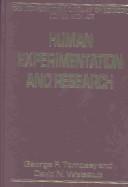
ISBN: 0754622266 Year: 2003 Publisher: Aldershot Ashgate
Abstract | Keywords | Export | Availability | Bookmark
 Loading...
Loading...Choose an application
- Reference Manager
- EndNote
- RefWorks (Direct export to RefWorks)
Human experimentation is essential to advance scientific knowledge and thereby improve the longevity and quality of human lives. This text covers some of the legal, technical, ethical and moral problems raised by human experimentation.
Human experimentation in medicine --- Law and legislation. --- Moral and ethical aspects. --- experiment, experimenteel onderzoek (mensen) --- proefpersonen --- onderzoeksethiek --- klinische proef (klinische studie, geneesmiddelenstudie) --- expérimentation sur la personne humaine (chez l'humain) --- sujets (participants) d'expérimentation --- éthique de la recherche --- essai clinique (étude clinique) --- Law and legislation --- Moral and ethical aspects --- Medical laws and legislation
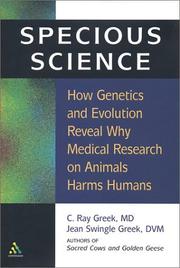
ISBN: 0826413986 Year: 2002 Publisher: New York Continuum
Abstract | Keywords | Export | Availability | Bookmark
 Loading...
Loading...Choose an application
- Reference Manager
- EndNote
- RefWorks (Direct export to RefWorks)
Arguing that there is a great divide between species that makes extrapolation of biochemical research from one group to another utterly invalid, this book provides the argument's scientific underpinning in accessible language, examining paediatrics, brain diseases, new surgical techniques and more. The authors of this book argue that there is a great divide between species that makes extrapolation of biochemical research from one group to another utterly invalid. In their previous book, "Sacred Cows and Golden Geese: The Human Cost of Experiments on Animals", the Greeks showed how an amorphous but insidious network of drug manufacturers, researchers dependent on government grants to earn their living, even cage-manufacturers - among others benefiting from "white-coat welfare" - have perpetuated animal research in spite of its total unpredictability when applied to humans. (Cancer in mice, for example, has long been cured. Chimps live long and relatively healthy lives with AIDS. There is no animal form of Alzheimer's disease.) In doing so, the Greeks aimed to blow the lid off the "specious science" we have been culturally conditioned to accept. Taking these revelations one step further, this book uses accessible language to provide the scientific underpinning for the Greeks' philosophy of "do no harm to any animal, human or not," by examining paediatrics, diseases of the brain, new surgical techniques, in vitro research, the Human Genome and Proteome Projects, an array of scientific and technological breakthroughs and more.
Animal experimentation --- Animal models in research. --- Diseases --- Animal models. --- experiment, experimenteel onderzoek (dieren, dierproeven) --- experiment, experimenteel onderzoek (mensen) --- expérimentation sur l'animal --- expérimentation sur la personne humaine (chez l'humain) --- Animal experimentation. --- Animal models in research --- Animal disease models --- Disease models, Animal --- Medicine, Comparative --- Medicine, Experimental --- Pathology, Comparative --- Pathology, Experimental --- Biological models --- Laboratory animals --- Research --- Experimentation on animals --- Zoopery --- Animal models

ISBN: 0195071034 Year: 1994 Publisher: New York Oxford University Press
Abstract | Keywords | Export | Availability | Bookmark
 Loading...
Loading...Choose an application
- Reference Manager
- EndNote
- RefWorks (Direct export to RefWorks)
An authoritative, interdisciplinary approach to the field of biomedical and behavioural research with children, which encompasses aspects of science, medicine, child psychology, ethics and the law. This interdisciplinary text is the first to address the many questions and controversies surrounding the use of children as research subjects. Experts in the field of biomedical and behavioural research with children consider the issues in terms of biomedical science, child psychology, ethics, and the law, providing a careful balance between individual and societal benefits. This practical guide will be invaluable to everyone involved in performing or reviewing research involving children.
Experimentation on man [Medical ] --- Expériences médicales sur l'homme --- Geneeskundige proefnemingen op de mens --- Human experimentation in medicine --- Medical experimentation on humans --- Proefnemingen [Geneeskundige ] op de mens --- Pediatrics --- -Children --- -Human experimentation in medicine --- Children --- -experiment, experimenteel onderzoek (mensen) --- kinderen --- #GBIB:CBMER --- Childhood --- Kids (Children) --- Pedology (Child study) --- Youngsters --- Age groups --- Families --- Life cycle, Human --- Experimentation on humans, Medical --- Medical ethics --- Medicine --- Medicine, Experimental --- Clinical trials --- Paediatrics --- Pediatric medicine --- Research --- -Moral and ethical aspects --- Legal status, laws, etc --- expérimentation sur la personne humaine (chez l'humain) --- enfants --- Diseases --- Health and hygiene --- Human experimentation in medicine. --- Child Advocacy. --- Ethics, Medical. --- Human Experimentation --- Legal status, laws, etc. --- Moral and ethical aspects. --- in infancy & childhood. --- experiment, experimenteel onderzoek (mensen) --- Child welfare --- Research&delete& --- Moral and ethical aspects --- Law and legislation --- Law --- Pediatrics - Research - Moral and ethical aspects. --- Children - Research - Moral and ethical aspects.

ISBN: 0253346355 Year: 2005 Publisher: Bloomington Indiana university press
Abstract | Keywords | Export | Availability | Bookmark
 Loading...
Loading...Choose an application
- Reference Manager
- EndNote
- RefWorks (Direct export to RefWorks)
Aims to create a framework for bioethics. This book focuses on the need to advance medical knowledge by using human beings in research. It presents an account of the way American medicine reached a protectionist approach to manage this paradox. It casts light on the origins of bioethics and document of human experimentation, the Nuremberg Code.
klinische ethiek --- methodologie --- filosofie (filosofische aspecten) --- experiment, experimenteel onderzoek (mensen) --- Nuremberg code --- neuroethiek --- éthique clinique --- méthodologie --- philosophie (aspects philosophiques) --- expérimentation sur la personne humaine (chez l'humain) --- neuroéthique --- Bioethics. --- Medical ethics. --- Bioethical Issues --- Bioethics --- Medical ethics --- Biomedical ethics --- Clinical ethics --- Ethics, Medical --- Health care ethics --- Medical care --- Medicine --- Biology --- Life sciences --- Life sciences ethics --- Moral and ethical aspects --- Professional ethics --- Nursing ethics --- Social medicine --- Science
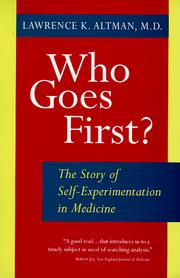
ISBN: 0520212819 Year: 1998 Publisher: Berkeley California university press
Abstract | Keywords | Export | Availability | Bookmark
 Loading...
Loading...Choose an application
- Reference Manager
- EndNote
- RefWorks (Direct export to RefWorks)
A history of the controversial practice of self-experimentation. In telling the stories of pioneering researchers, the text offers a history of many of the most important medical advancements in recent years as well as centuries past - from anesthaesia to yellow fever to heart disease. Lawrence Altman has authored the only complete history of the controversial and understudied practice of self-experimentation. In telling the stories of pioneering researchers, Altman offers a history of many of the most important medical advancements in recent years as well as centuries past--from anesthesia to yellow fever to heart disease. With a new preface, he brings readers up to date and continues his discussion of the ethics and controversy that continue to surround a practice that benefits millions but is understood by few.
Medicine --- Self-experimentation in medicine --- History of Medicine, Modern. --- Physicians --- Human Experimentation --- Research Personnel --- Research personnel --- Research --- History. --- biography. --- history. --- geneeskunde (medische aspecten) --- experiment, experimenteel onderzoek (mensen) --- zelf experimenteren --- geschiedenis (historische aspecten) --- médecine (aspects médicaux) --- expérimentation sur la personne humaine (chez l'humain) --- l'expérimentation de soi --- histoire (aspects historiques) --- Autoexperimentation in medicine --- Experimentation on oneself in medicine --- Medical autoexperimentation --- Medical experimentation on oneself --- Medical self-experimentation --- Human experimentation in medicine --- Health Workforce --- Research&delete& --- History --- Biography.
Book
ISBN: 2130419178 9782130419174 Year: 1988 Volume: 2422 Publisher: Paris Presses universitaires de France
Abstract | Keywords | Export | Availability | Bookmark
 Loading...
Loading...Choose an application
- Reference Manager
- EndNote
- RefWorks (Direct export to RefWorks)
Medical ethics --- Eugenics --- Ethique médicale --- Eugénisme --- Nuremberg Medical Trial, 1946-1947 --- Eugénisme --- Medical bioethics --- Medical bioethics. --- Nuremberg Medical Trial, Nuremberg, Germany, 1946-1947. --- misdaad tegen de menselijkheid --- crime contre l'humanité --- Professional ethics. Deontology --- Human medicine --- 614.22 --- Désherbage --- Deselectie --- bio-ethiek (medische, biomedische ethiek, bio-ethische aspecten) --- experiment, experimenteel onderzoek (mensen) --- eugenetica (eugenese, eugenetiek) --- Medische ethiek --- bioéthique (éthique médicale, biomédicale, aspects bioéthiques) --- expérimentation sur la personne humaine (chez l'humain) --- eugénisme (eugénique) --- Ethique médicale --- Ethics, medical
Multi
ISBN: 9014035535 9014035527 Year: 1988 Publisher: Alphen aan den Rijn Samsom
Abstract | Keywords | Export | Availability | Bookmark
 Loading...
Loading...Choose an application
- Reference Manager
- EndNote
- RefWorks (Direct export to RefWorks)
Dit proefschrift van de arts en jurist Lucas Bergkamp handelt over medische experimenten met mensen. Bergkamp biedt een korte geschiedenis; een analyse van de definitie van een experiment; een overzicht van de rechtsontwikkeling in Nederland; een vergelijkend overzicht van de regelgeving in de V.S., Frankrijk, Zwitserland, West-Duitsland, Zweden; een overzicht van de normen waaraan experimenten moeten voldoen; een hoofdstuk over aansprakelijkheid en verzekeringen; en de belangrijkste bevindingen uit zijn onderzoek naar het functioneren van de zogenaamde toetsingscommissies-experimenten in Nederland.
Status of persons --- Professional ethics. Deontology --- Human Experimentation. --- #GBIB:CBMER --- 61.001.5 --- 57.08 --- 17.023.33 --- experiment, experimenteel onderzoek (mensen) --- geschiedenis (historische aspecten) --- recht (wetgeving, rechtspraak, rechtsbeginselen, juridische aspecten, aansprakelijkheid) --- commissie voor medische ethiek (ethisch comité, CME) --- Human Research Subject Protection --- Experimentation, Human --- Helsinki Declaration --- Bioethical Issues --- Ethics, Research --- Embryo Research --- Fetal Research --- Research Subjects --- expérimentation sur la personne humaine (chez l'humain) --- histoire (aspects historiques) --- droit (aspects juridiques, législation, jurisprudence, principes de droit, responsabilité) --- comité d'éthique médicale (comité d'éthique, CEM) --- Human experimentation --- Human experimentation. --- Human Experimentation --- Droit des personnes et de la famille
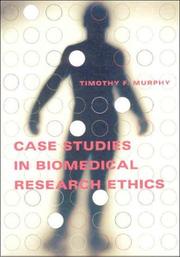
ISBN: 0262134373 0262632861 Year: 2004 Publisher: Cambridge MIT press
Abstract | Keywords | Export | Availability | Bookmark
 Loading...
Loading...Choose an application
- Reference Manager
- EndNote
- RefWorks (Direct export to RefWorks)
An overview of the key debates in biomedical research ethics, presented through a wide-ranging selection of 149 case studies. This textbook for instruction in biomedical research ethics can also serve as a valuable reference for professionals in the field of bioethics. The 149 cases included in the book are grouped in nine chapters, each of which covers a key area of debate in the field. Some of the case studies are classics, including the famous cases of the Tuskegee Syphilis Study (in which subjects with syphilis were not given treatment) and the Willowbrook hepatitis studies (in which institutionalized subjects were intentionally exposed to hepatitis). Others focus on such current issues as human embryonic stem cell research, cloning by somatic nuclear transfer, and the design and function of institutional review boards. Each chapter begins with a brief introduction that places the issues raised in context; this is followed by a number of cases (each of which is no more than a few pages). Study questions meant to encourage further discussion follow each case. After an introductory discussion of the history and tenets of ethics in medical research, the book's chapters cover the topics of oversight and study design; informed consent; the selection of subjects; conflicts of interest; the social effects of research; embryos, fetuses, and children; genetic research; the use of animals; and authorship and publication. Following these chapters are appendixes with the texts of the Nuremburg Code and the Declaration of Helsinki, two key documents in the establishment of bioethical standards for research.
Professional ethics. Deontology --- Human medicine --- Bioethics --- Medical ethics --- Research --- experiment, experimenteel onderzoek (mensen) --- bio-ethiek (medische, biomedische ethiek, bio-ethische aspecten) --- casuïstiek (gevallenstudie, gevalstudie) --- geïnformeerde vrijwillige toestemming (instemming) --- proefpersonen --- belangenconflict --- genetica (genen) --- experiment, experimenteel onderzoek (dieren, dierproeven) --- expérimentation sur la personne humaine (chez l'humain) --- bioéthique (éthique médicale, biomédicale, aspects bioéthiques) --- casuistique --- consentement libre et éclairé --- sujets (participants) d'expérimentation --- conflit d'intérêt --- génétique (gènes) --- expérimentation sur l'animal --- Biomedical ethics --- Clinical ethics --- Ethics, Medical --- Health care ethics --- Medical care --- Medicine --- Biology --- Life sciences --- Life sciences ethics --- Moral and ethical aspects --- Professional ethics --- Nursing ethics --- Social medicine --- Science
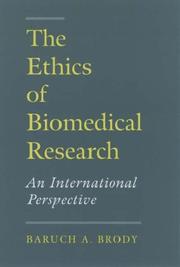
ISBN: 0195090071 9780195090079 Year: 1998 Publisher: New York Oxford university press
Abstract | Keywords | Export | Availability | Bookmark
 Loading...
Loading...Choose an application
- Reference Manager
- EndNote
- RefWorks (Direct export to RefWorks)
This book analyzes the major issues of research ethics through a careful review of the treatment in official policies on research ethics developed throughout the world (especially North America - Western Europe - and the Pacific Rim).
Professional ethics. Deontology --- Human medicine --- Human experimentation in medicine --- Medical ethics. --- Medicine --- Research. --- Ethics, Medical. --- Moral and ethical aspects. --- Research --- biomedisch, medisch-wetenschappelijk onderzoek --- ethiek (ethische aspecten) --- experiment, experimenteel onderzoek (dieren, dierproeven) --- experiment, experimenteel onderzoek (mensen) --- Medisch onderzoek --- Medische ethiek --- Dierproef --- Dierenwelzijn --- recherche biomédicale --- ethique (aspects ethiques) --- expérimentation sur l'animal --- expérimentation sur la personne humaine (chez l'humain) --- Recherche médicale --- Ethique médicale --- Expérimentation animale --- Bien-être des animaux --- Medical ethics --- Health Workforce --- Biomedical ethics --- Clinical ethics --- Ethics, Medical --- Health care ethics --- Medical care --- Bioethics --- Professional ethics --- Nursing ethics --- Social medicine --- Moral and ethical aspects --- Research&delete& --- Medicine - Research - Moral and ethical aspects --- Human experimentation in medicine - Moral and ethical aspects

ISBN: 0195070429 Year: 1992 Publisher: New York Oxford Oxford University press
Abstract | Keywords | Export | Availability | Bookmark
 Loading...
Loading...Choose an application
- Reference Manager
- EndNote
- RefWorks (Direct export to RefWorks)
The atrocities committed by Nazi physicians and researchers during World War II prompted the development of the Nuremberg Code to define the ethics of modern medical experimentation utilizing human subjects. Since its enunciation, the Code has been viewed as one of the cornerstones of modern bioethical thought. The sources and ramifications of this important document are thoroughly discussed in this book by a distinguished roster of contemporary professionals from the fields of history, philosophy, medicine, and law. Contributors also include the chief prosecutor of the Nuremberg Military Tribunal and a moving account by a survivor of the Mengele Twin Experiments. The book sheds light on keenly debated issues of both science and jurisprudence, including the ethics of human experimentation; the doctrine of informed consent; and the Code's impact on today's international human rights agenda. The historical setting of the Code's creation, some modern parallels, and the current attitude of German physicians toward the crimes of the Nazi era, are discussed in early chapters. The book progresses to a powerful account of the Doctors' Trial at Nuremberg, its resulting verdict, and the Code's development. The Code's contemporary influence on both American and international law is examined in its historical context and discussed in terms of its universality: are the foundational ethics of the Code as valid today as when it was originally penned? The editors conclude with a chapter on foreseeable future developments and a proposal for an international covenant on human experimentation enforced by an international court. A major work in medical law and ethics, this volume provides stimulating, provocative reading for physicians, legal professionals, bioethicists, historians, biomedical researchers, and concerned laypersons. The Nazi atrocities committed during World War II prompted the development of the Nuremberg Code to guide the ethics of modern medical experimentation utilizing voluntary human subjects. This study examines the history, nature, scope and place of the Code in medical research.
Human experimentation in medicine --- Medical ethics --- Expérimentation humaine en médecine --- Ethique médicale --- Moral and ethical aspects --- History --- Law and legislation --- Aspect moral --- Histoire --- Droit --- Moral and ethical aspects. --- Ethics, Medical --- Human Experimentation --- War Crimes --- -geneeskunde (medische aspecten) --- experiment, experimenteel onderzoek (mensen) --- nazisme --- Nuremberg code --- #GBIB:CBMER --- Experimentation on humans, Medical --- Medical experimentation on humans --- Medicine --- Medicine, Experimental --- Clinical trials --- history. --- legislation & jurisprudence. --- médecine (aspects médicaux) --- expérimentation sur la personne humaine (chez l'humain) --- code de Nuremberg --- Research --- Germany. --- Expérimentation humaine en médecine --- Ethique médicale --- geneeskunde (medische aspecten) --- history --- legislation & jurisprudence
| Listing 1 - 10 of 29 | << page >> |
Sort by
|

 Search
Search Feedback
Feedback About
About Help
Help News
News